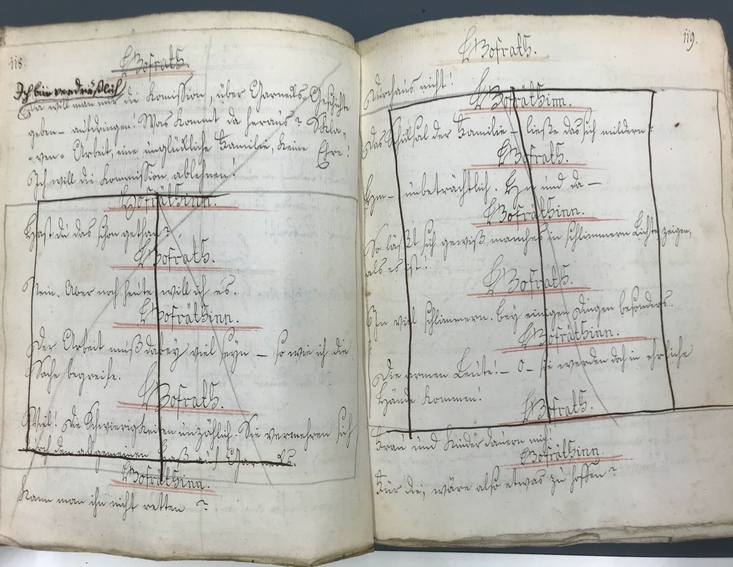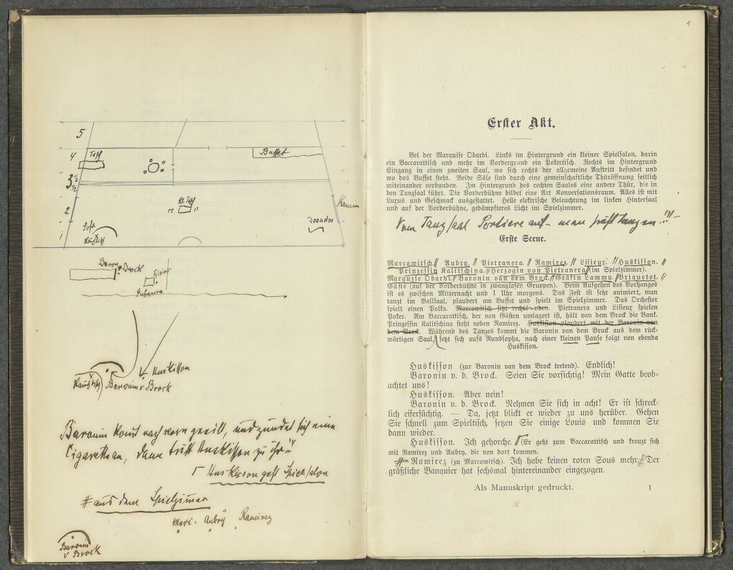Multilayered Writing in Hamburg Prompt Books and Playbooks since the 18th Century
2019–2025
RFD08
Part 1 (2019–2022)
The first part of the project examined a selection of multilayered prompt books archived in the ‘Theatre-Library’ collection, which includes around 3,500 spoken theatre books for 2,100 plays, at the Hamburg State and University Library from the late 18th to and early 19th century. These prompt books were created by multiple participants engaging in diverse manuscript practices which continually revised the unfixed literary text within its theatrical context. Based on the results, the project has come up with a transdisciplinary approach towards handwritten artefacts in modern European theatre by exploring the many-handed creation, handwritten transformation and often decades of use of prompt books in a time increasingly dominated by print. A respective monograph can be accessed here (open access). The project also contributed to the theoretical elaboration of the concept of ‘layering’ in Research Field D: (Re)Shaping Written Artefacts.
The prompt book for the scandal-ridden 1776 Hamburg production of Shakespeare’s Othello was both featured as ‘Artfefact of the Month’ and in UWA’s exhibition ‘Written Treasures of Hamburg. New Questions to Old Manuscripts’.
Part 2 (2023–2025)
Building on the methodological approach developed in its first three years, the continuation of the project included additional types of written artefacts for staging while branching out historically and further refining its framework: the project focused on early 20th century multilayered written artefacts from the 'Theatersammlung' (theatre collection) at Staatsbibliothek Hamburg. Based on the breadth of the collection, the project was able to outline the manuscript practices with regard to mixed-media and multigraphic written artefacts: handwriting persisted and often dominated in the interaction with print, early typewriting and the history of photocopying; a large number of the written artefacts for staging integrated drawings. Above all, the early 20th-century rise of the artistic director ('Regisseur') gave way to a prominent new type of multilayered and multigraphic written artefact in the performing arts: the 'Regiebuch' (director's staging book) which, in sharp contrast with common academic approaches, the project squarely situated within the performing arts manuscript culture as a whole: while written artefacts for staging tend to have less and less layers, the network of the written artefacts of the different professions (director, stage manager, prompter, actor) gives an account of the theatre practices at the time. Such a network bears witness to the huge amount of handwriting and the great variety of manuscript practices that went into the staging of a production. This held especially true for the most spectacular items of the 'Theatersammlung': director's books by one of the originators of European 20th-century directors' theatre ('Regietheater'), Leopold Jessner (at Thalia Theater from 1904 to 1915), whose main estate was lost during his exile.
From 25 September to 27 October 2024, the project put on an exhibition showcasings Jessner’s written artefacts in the context of the manuscript culture of theatre. This happened in collaboration with Staatsbibliothek and Thalia Theater. The exhibition has resulted in an extensive catalogue and a digital tour. A monograph detailing Jessner’s Hamburg work with his written artefacts for staging is in preparation.
The project edited a digital transcription of three exemplary staging books of Jessner’s time in Hamburg: (1) Jessner’s meticuously prepared 1904 director’s book for Berton’s Yvette, with which he applied for the job at Thalia Theater. (2) one of the few Jessner’s director’s book based on a handwritten template – for the 1906 Christmas play The Thousandfold Beauty, also one of the rare plays by women, Amélie Nikisch and Ilse Friedländer. (3) the stage manager’s book for Jessner’s staging of Büchner’s Danton’s Death, in which not only Jessner’s novel use of lighting came to the fore. Since the written artefact was put to use on two distinct stages, the stage manager’s writing and manuscript practises were exhibited in a prominent fashion.
People
Project lead: Martin Jörg Schäfer
Research Associates: Alexander Weinstock (2019-2022); Anna Sophie Felser (2023-2025)


